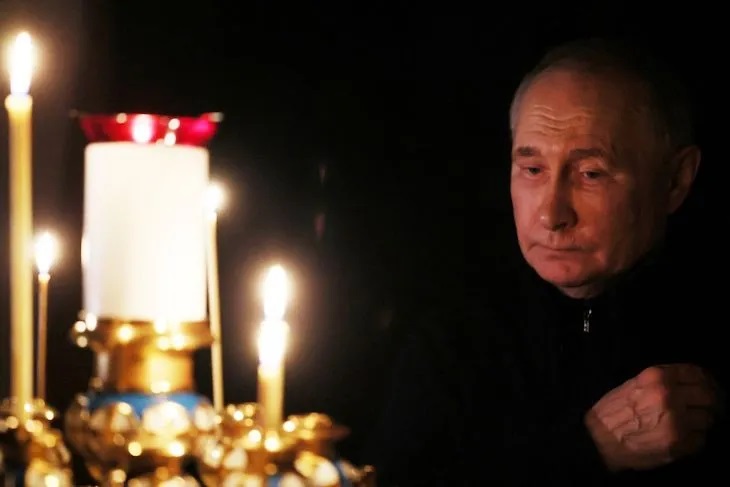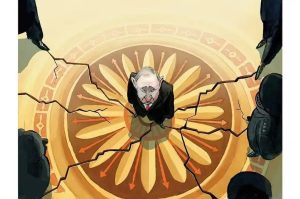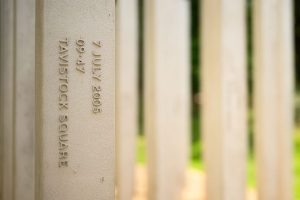The Crocus City Hall attack blindsided Putin’s vast security state. Employing nearly a million policemen, 340,000 national guards and over 100,000 spies, that apparatus has proved ruthlessly efficient at terrorizing babushkas bringing flowers to Alexei Navalny’s grave, tracking down lone bloggers and persecuting homosexuals. But as the Crocus attack demonstrated, the Kremlin’s securocrats are utterly incompetent at doing their actual job, which is to protect the lives of Russian citizens. Rather than keep a relentless watch for emerging threats from all over the region, Putin’s security chiefs have instead focused on only two tasks — repressing internal dissent, and stealing money.
Putin is locked into his own lies about Ukraine
The tragic result was that the Islamic State of Khorasan Province (IS-K) was able to mount its spectacular attack unhindered. On a tactical level, that meant unpreparedness and confusion. Video circulating on social media shows policemen and security guards sprinting away from the gunfire in the Crocus Hall’s lobby. It took nearly an hour for armed support to arrive, allowing the gunmen to flee the scene. Some have claimed that as evidence the attack was a false flag operation. But far more likely the delay was caused by an operational wrangle between police, national guards and the federal security service and further complicated by the fact that Crocus is in fact outside the capital’s city limits and in the jurisdiction of Moscow Province, not Moscow itself. The car park of Crocus City Hall is just thirty seconds’ drive from the main Moscow ring road, which links with every one of Russia’s main motorways.
But the more serious failure was on a strategic level. The Kremlin may not have been paying attention to the rise of IS-K. But the Americans were. On March 6, the US Embassy in Moscow issued a public security alert. “The Embassy is monitoring reports that extremists have imminent plans to target large gatherings in Moscow, to include concerts,” the notice read. “US citizens should be advised to avoid large gatherings.”
At the same time, US security liaison officers in Moscow reportedly passed intelligence on to their Russian counterparts, following the principle of “responsibility to warn” countries of imminent terror attacks, regardless of political relations. The Kremlin snubbed the US warning as “not specific enough.” Putin, just days before the Crocus attack, publicly dismissed the warning as “a provocation.”
That comment did not age well. The truth is that Russia, Europe and the US all face a common enemy in the form of Islamist terror. The Crocus attack is just the latest in a long line of dozens of Islamist militant attacks on Christian targets that include the Manchester Area bombing, the Paris Bataclan shootings, and 9/11. In the aftermath of 9/11, Putin was one of the first world leaders to call George W. Bush and offer support. Russia did not formally join Bush’s global War Against Terror — but Putin did acquiesce as the US created airbases in its backyard in Central Asia to support the coalition’s assault on the Taliban.
Russia, Europe and the US all face a common enemy in the form of Islamist terror
But instead of acknowledging the overwhelming evidence that this was an Islamist attack — for instance the IS-K’s own claim of responsibility, the gruesome body cam footage released by IS-K of the terrorists murdering innocent civilians, the arrest and identification of the Tajik culprits — Putin and his propagandists continue to insist on absurdly pointing the finger not only at Ukraine but at the US too. One of Russia’s major channels, NTV, broadcast a fake video using Al-generated audio of top Ukrainian security official Oleksiy Danilov appearing to say, “It is fun in Moscow today. I think it’s a lot of fun. I would like to believe that we will arrange such fun for them more often.”
Even more shockingly, Russian foreign ministry spokeswoman Maria Zakharova called US reports of IS-K involvement an “attempt by American political engineers to cover themselves and the Zelensky regime they created with the scarecrow of ISIS… What is the logic, you may ask? Money and power.” Zakharova accused the US of “sowing a ‘controlled chaos’ and reshaping the world order by the hands of terrorists.”
To hear that level of delusion and conspiracy theorizing from the spokesperson of a nuclear power and UN Security Council permanent member is not only insane — it’s terrifying. And like so much of the unhinged bluster coming from the Kremlin, it’s indicative of weakness, not strength.
This is the rhetoric of a leadership which has not only lost touch with reality — they have lost control of Russia’s security too. The Crocus attack, for Putin, has to be about Ukraine because he has invested so much political capital insisting that the greatest existential threat to Russia is from Nazis in Kyiv. The Ukraine war now consumes 40 percent of his state budget and much of his security forces’ resources — the rest going on repression of dissidents. Putin doesn’t have the bandwidth, ideologically or militarily, to do anything about the true threat to his citizens lives in the form of Islamist militancy. He is locked into his own lies about Ukraine and the supposed Western conspiracy to destroy Russia while ignoring a very real and deadly conspiracy brewing in Central Asia.
When Putin came to power in 2000, he offered the Russians a bargain: to provide prosperity and security in exchange for surrendering their freedoms. A quarter of a century later, Putin’s national security incompetence has proved staggering. In 2022, his spies and generals assured him that Russian forces would sweep to victory and occupy Kyiv in just three days, grossly underestimating Ukraine’s fighting capabilities and spirit as well as the West’s response. In 2023, those same spies completely failed to predict or check a major mutiny by Wagner chief Evgeny Prighozin. And in 2024, they dismissed US intelligence on imminent terrorist attacks and failed to defend the Russian people. Putin has made Russia less secure and less prosperous.
What Putin should be doing in response to the Crocus attack is what Bush attempted in 2001 — assemble a broad international coalition to root out the terrorists and fix the failed states who shelter them. According to Ahmed Rashid, scholar of the Taliban and Central Asian militancy, the strongholds of the IS-K in Afghanistan and Tajikistan are beyond the control of a central government. But Russians are so hated in Central Asia that there’s little chance of Moscow assembling a regional alliance to go after the terrorists in their homeland. To really fix the problem of Islamist militancy Putin needs allies not only in the region but across the world. But he has none of either.
As it is, all Putin can do is to try to manufacture evidence of a Ukrainian connection and retaliate, pointlessly, there. It’s not yet known exactly how Putin will react to the Moscow terror attack — the return of the death penalty is one likely result — but it is clear that he will have to be seen to do something major and violent. Like Hitler after the Reichstag fire of 1933, he will use the Crocus attack for his own political ends. But he is not the master of the situation. Two weeks ago in his state of the nation speech Putin seemed to be downplaying the war in Ukraine and focusing instead on the economy. In the wake of the Crocus attack he no longer has that option. Instead, he will now have to escalate in the only way his resources and limited imagination allow — by doubling down with fire and fury on Ukraine.
This article was originally published on The Spectator’s UK website.


























Leave a Reply